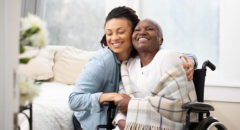
Being a host for the holidays can invite a mix of people into your home. That can mean that some of your guests have different needs than others. In this case, you need to ensure your home is ready for them and won’t negatively affect their quality of life. Fortunately, there are a few ways you can modify your home to make it more accessible without tearing it apart.
Why Modifications are Important
For people with disabilities, being in someone else’s home can be a lot more than just inconvenient. Without the right modifications, they can be more prone to accidents and serious injuries. They may also lose the level of independence that they enjoy at home. That reduced independence can leave them feeling as if they’re bothering others when they ask for help. Given how busy the holidays already are, asking for assistance can be even more tiresome than usual and leave your guests feeling overwhelmed.
If you don’t have accommodations in integral areas such as bathrooms, it can lead to embarrassing situations that everyone would prefer to avoid. Additionally, an unmodified home can limit how much these guests can participate in the holiday activities. That can affect their mental health poorly as well.
At the very least, not making a few modifications to your home to accommodate your guests who have different abilities can make it hard for them to enjoy the holiday celebrations. That’s the last thing you want as a host.
15 Ways to Make Your Home Accessible
1. Clear Pathways
People who use wheelchairs and other mobile aids need to be able to move around unobstructed. The same is true for those who have issues with their vision. To make things easier for them, you should move your furniture to make room for them.
2. Make Room Downstairs
If you have a spare room or any kind of space that can be made into a bedroom, that would be helpful for people who have trouble going up the stairs. This also allows your guest to have easy access to their room without needing anyone’s assistance.
3. Check Your Stairs
Generally, people who use mobility aids or are older may put more pressure on stairs and handrails as they move around. To avoid any accidents, it’s best to check that your stairs can handle the strain.
4. Install Grab Bars
Grab bars can be a great aid to those who need help getting around and standing. You can install them along the walls of the home, in bedrooms, and the kitchen. The most common place to have them, however, is in the bathroom. Grab bars can help with rising from the toilet as well as getting in and out of the shower.
5. Remove Rugs
When you have a disability, rugs are an accident waiting to happen. They make it easier for people to lose their footing when using a mobility aid or dealing with low vision.
6. Keep Cords Away
Cords are a big trip hazard on a regular day, let alone when you’re living with a disability. The best thing you can do is find ways to get them out of the way. Many people clip cords along the walls or move electronics so they’re close to outlets.
7. Use Braille Tags
If your guest is visually impaired and familiar with Braille, it can help to label essential items and areas using that mode of communication. Doing so will help them become familiar with their surroundings more easily.
8. Use the Right Lighting
Unless you’re having trouble with your vision, you might not notice how poorly lit your home is. To fix this, consider including more lighting along the walls of the living and dining areas. There are portable lights that are ideal for this. Additionally, while flickering lights can be pretty, they can also be painful for those who have sensory sensitivities so it’s best to avoid them.
9. Get a Shower Chair
Shower chairs are an easy way to assist those who need to be seated in the shower.
10. Go Non-Slip
Non-slip rugs are an integral addition to your bathroom when your guests have disabilities. Slippery rugs can easily cause a slip-and-fall accident.
11. Get a Portable Ramp
Accessibility starts with ensuring that your guests can get into your house. That’s where ramps come in. Since building a ramp can be an expensive venture, consider calling around for portable ramps that you can rent. However, you need to ask for ramps that are compliant with the American Disabilities Act (ADA) so you get one that can withstand the weight of a wheelchair.
12. Go Minimalistic
Minimalistic decorations can make it easier to maintain a certain amount of space in your home. You can also switch things around easily throughout the celebrations when needed.
13. Have a Plan for Pets
Pets are a part of the family and you may need to make changes to how you handle them, too. Large dogs can easily topple people who use mobility aids. Smaller dogs and cats can trip them as well. People with low vision may accidentally step on pets – causing injury to them and getting hurt in the process.
14. Make a Safe Room
Despite your efforts, it’s possible for your guests to become overwhelmed and need a safe space that’s less stimulating. Your safe room can give them that option. This room would have only as much lighting as they need.
15. Incorporate Visual and Hearing Aids
Many people who have trouble with their vision and hearing use aids that make their daily lives easier. These can include connecting their hearing aids to special apps on Smart televisions or using Bluetooth devices that communicate information to only them about what’s going on in a room.
RELATED: 7 Types Of Assistive Hearing Devices You Need To Know
How to Talk to Your Family About It
While these changes are meant to make your home more accessible for those who need it, that doesn’t mean the other people in the house won’t need to get used to them, too. Before you make any changes, it’s a good idea to talk to your family about what you need to do. It’s best to broach the topic while also arranging a conversation with those who will need the modifications.
When talking to your potential guests, you should find out which accommodations they need and how you can help. If they have aids they’ll bring with them, you should ask if there’s anything you need to change for that as well. For example, some hearing aids pair with electronic devices to ensure that the user can hear what’s going on. Knowing this information can help you to prepare your television for them.
Once you have the information, you can inform your family about the accommodations that will be necessary and how they can help. One great way to get your kids involved is to have them keep an eye on the pets. It may be an extra responsibility but think about ways to make it fun so they enjoy their duties.
Finally, you have to establish a budget. Though some changes to your home won’t come at a cost, there may be a few things that will require some money. In that case, you need to discuss what you’re able to spend on modifying your home. It’s essential to note that if you’re making permanent changes like guard rails, you can check out state and federal resources that are meant to help.
Millions of Americans have disabilities but that shouldn’t prevent them from enjoying the holidays. If your guests need special accommodations, you should make all the changes you can so they can make the most of the holidays, too.









